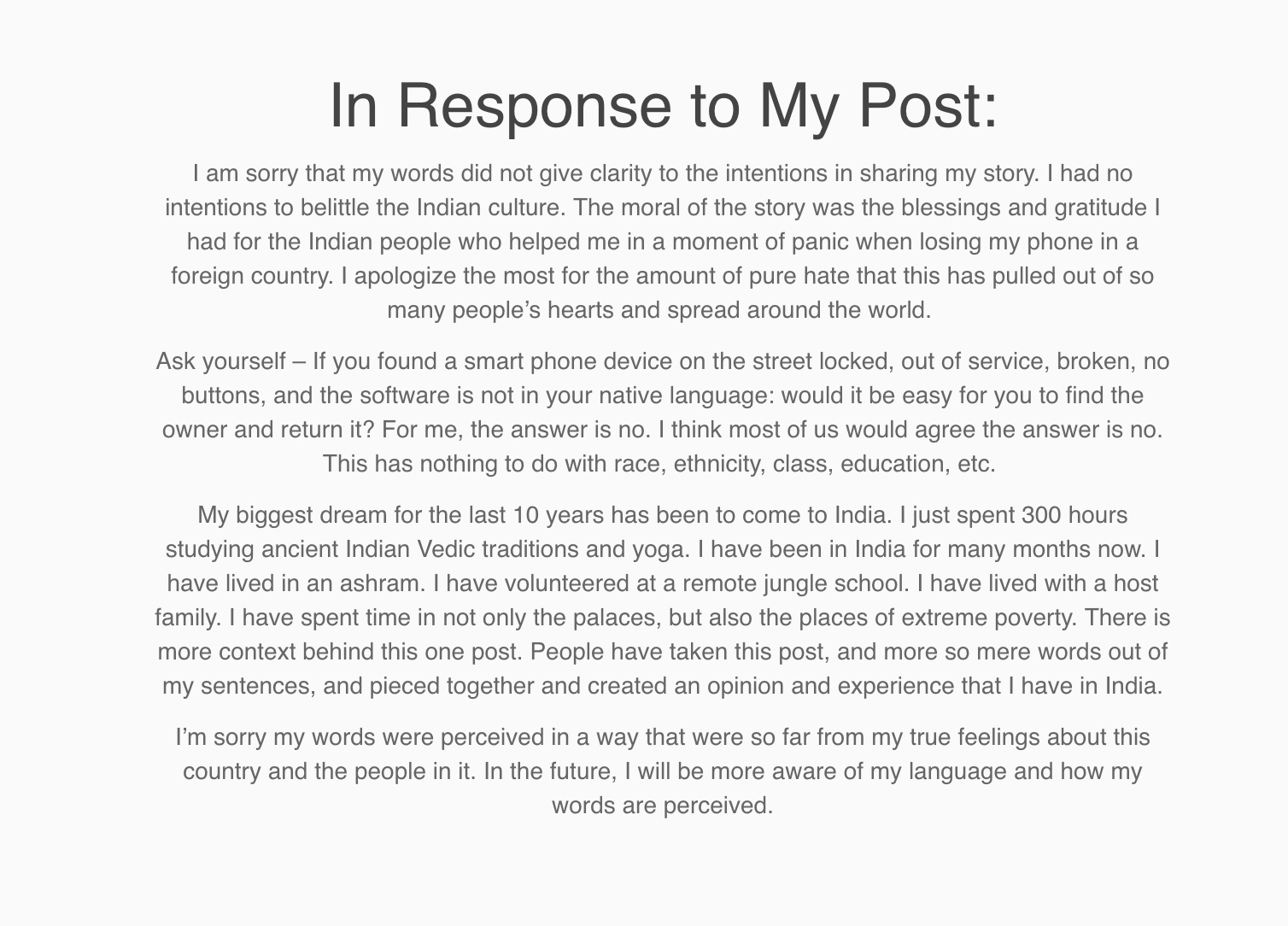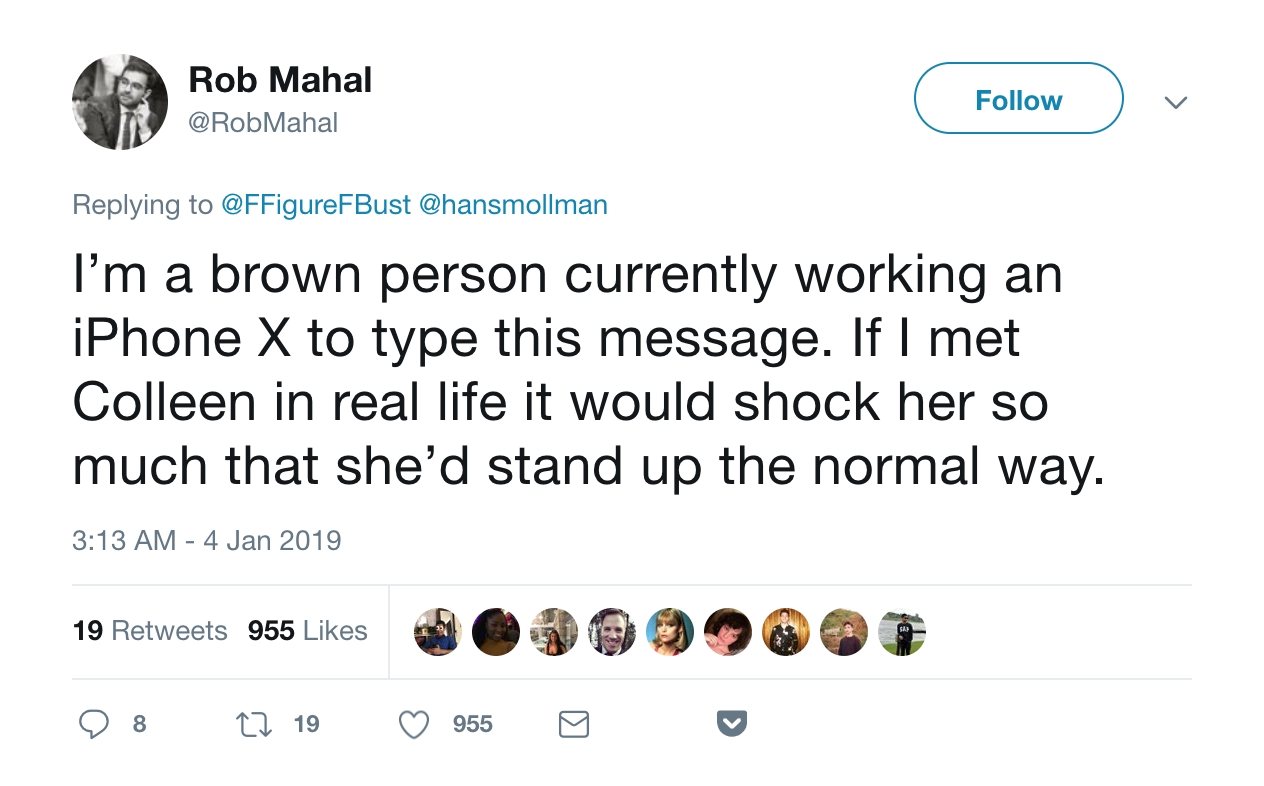
Travel, we are told, makes us better people. When you travel, you develop a truer sense of self. You learn empathy. There are endless studies that show that travel and exposure to other cultures can reduce racial bias. But that’s not always going to be the case and the learning curve won’t always feel easy — as evidenced by the recent outrage over an Instagram post by travel influencer Colleen Grady (aka @mindbodycolleen).
Last month, Grady went on a rant peppered with troubling implications, after losing her iPhone in India. In a now-deleted post, she explained that she’d lost (and later found) her brand new iPhone X in Jaipur. “Yep,” she wrote. “Lost it in the poorest most overcrowded country I have ever visited and one of the most scammy tourist cities in all of India.”
The post — which drew a number of short-sighted conclusions that seemed well beyond Grady’s range of expertise — was met with significant backlash. “I felt kind of hopeless,” she wrote in the caption. “That phone is worth more money than some people in this country will have in their whole lifetime.” She continued that the phone was too complicated for most Indians to figure out and that “miraculously” the phone was recovered by a fellow iPhone owner. She also wondered whether she should have brought mace to the dark alley where she went to retrieve it.
If we see another brand collaborating with racist @mindbodycolleen we will take them down! Are these the values you want to project as a brand? pic.twitter.com/pUgALbtpT2
— Juanny DeVito (@juannydevito) January 2, 2019
Considering the powerful position that travel influencers have in, quite literally, influencing travel, the post caused a tidal wave of fury (and very uncool death threats) in India and beyond. The anger all stemmed from the assumptions Grady seemed to draw about a massive nation while pulling from her own limited experience as, ironically enough, a yoga instructor. This is to say nothing of the descriptor of Jaipur, population three million, as “scammy” writ-large.
After the post started gaining international attention, Grady shuttered all of her social media accounts and froze her blog, mindbodycolleen.com, which now lands on an apology page.

In part, she wrote, “This has nothing to do with race, ethnicity, class, education, etc. My biggest dream for the last 10 years has been to come to India. I just spent 300 hours studying ancient Indian Vedic traditions and yoga. I have been in India for many months now. I have lived in an ashram. I have volunteered at a remote jungle school. I have lived with a host family. I have spent time in not only the palaces, but also the places of extreme poverty. There is more context behind this one post.”
She ended her apology by stating, “I’m sorry my words were perceived in a way that were so far from my true feelings about this country and the people in it.”
There’s not much actual apologizing going on. It’s more of an explanation than an admission that the post may have irked people for good reason. But it’s not like anyone wants Grady to throw herself into a volcano over an ill-thought-out post, either. This issue is more of a starting point for a conversation about the power of Instagram to help shift how we travel (for better or worse) and the responsibility of people acting as tourism ambassadors.
Instagram influencers, particularly travel influencers, are fascinating because they are, by and large, normal (super attractive) people. Like travel writers — interlopers who try to get some sense of a place during a visit but surely can’t fathom the complexity of entire nations over the course of weeks or even months — influencers have a responsibility to limit the scope of the conclusions they draw. And, when reflecting on the struggles of developing nations, to place them in a larger context. In large part, the crime and economic woes about which Grady complained in her post are, in part, due to the lasting effects of British imperialism. Further, the way Grady and a disturbing number of influencers use India and other developing nations as an income source echoes that model.

In The Story of the Lost Child, the final installation of Elena Ferrante’s Neapolitan novel cycle, the protagonist Lenù is fully grown and, at last, a successful writer. With that success comes travel. And with that travel, she observes, “It was marvelous to cross borders, to let oneself go within other cultures, discover the provisional nature of what I had taken as absolute.”
This is travel at its best: travel that allows one to see beyond the edges of one’s own mind, to dissolve the borders built around one’s experience that tell the lie of absolutism, of finality, of unquestionable reality. Grady’s post is an opportunity for us to all question what we take as absolute. To look inward and ask ourselves: “What assumptions do I carry with me?” “How quick am I to draw conclusions?” And — in what ought to be the traveler’s mantra — “What if my assumptions and conclusions are short-sighted or flat-out wrong?”






